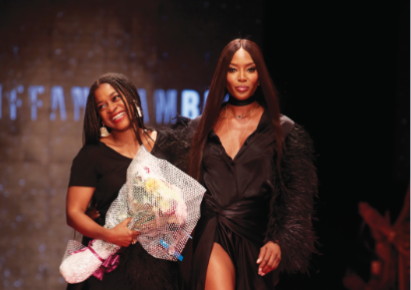For the fashion-conscious Nigerian elite, Lagos has a new design paradigm that could rival some of the world’s best brands.
The Lagos Fashion & Design Week (LFDW) in October 2018 saw more than 50 top designers congregate to create everything from intricate wedding gowns with stunning fabric, woven with traditional techniques from across the country to high-end and trendy ready-to-wear pieces for the upwardly-mobile millennial consumer.
The annual LFDW has a vision to create a fashion platform that merges the Nigerian and African fashion industry together as well as providing a marketplace for buyers, consumers and the media to view the current collections of designers at a four-day event filled with glitz and glamour.
According to a report by McKinsey, the global fashion industry is projected to reach a staggering $2.4 trillion in 2016.
Nigeria’s fashion retail market itself accounts for about $4.7 billion according to data from Euromonitor. However, Nigerian fashion brands need to warm up to the emergence of a new connected consumer, well-synced with the latest in global apparel and fashion trends, if they are to capture a due share of this growth.
Loading...

Folake Akindele (left). Picture:Supplied
Folake Akindele design. Picture:Supplied
This is certainly one aspect Folake Akindele, founder of fashion brand, Tiffany Amber and one of the most revered designers in Nigeria, is hoping to address with her new collection, ‘Made in Africa, Made for Now’.
“Tiffany Amber was the first ready-to-wear brand in Nigeria. I remember when I launched, I said I wanted to bring African women in line with fashion trends around the world. Because I was the first in this industry, I had to make my own rules because there was nobody out there to look up to,” says Akindele, who studied in the cool climes of Switzerland. Her mission is to change the perception of Nigerian fashion but that was not always her calling.
“The real flair for fashion came when I went to law school in Abuja. I made clothes for myself and everyday, people would stop me and ask ‘where did you buy these clothes from’? So one day, I decided to make two suitcases of clothes to make a little side business and I sold them in two hours and that is when I decided to toy with the idea of fashion as a business,” she says.
Nigeria’s fashion designers have found their way into the global market in many ways over the past couple of years. For instance, Akindele was recently short-listed to showcase her line at the fashion week in Paris; Maki Oh’s outfit was worn by pop sensation Beyoncé in her Lemonade video and Deola Sagoe has featured at the New York Fashion Week.
But a new breed of designers and entrepreneurs passionate about securing Nigeria’s place in the global fashion scene is rising and Akindele is leading that charge.

Folake Akindele’s designs. Picture: Supplied
Model in a Folake Akindele creation. Picture:Supplied
But today’s consumers are pushing for fast fashion where brands are being forced to create new collections faster if they want to stay competitive.
“We are in what I call the new design paradigm where consumers want great products that are trendy and unique at great value and at even greater speed. This puts pressure on new designers who invariably now fixate on curation over creation,” says Akindele.
This year marks her 20th year as a designer and 15 years since she launched Tiffany Amber. It is now time to take her brand global.
“I wanted the foundation of the brand to be so strong in Africa that it becomes a heritage brand before I can grow globally. For about 10 years, I was uninterested in the global market. I wanted to focus on Africa because I found it interesting that you travel to so many parts of Africa and you cannot go shopping because there are not many African brands. It was my first show at the New York Fashion Week that made me fall in love with the idea of the global scene because the brand was so very well-accepted and we got invited for the second and third time.”
With the emergence of e-commerce as a popular channel for fashion buying, the onus is now increasingly on brands to be collaborative and innovative. This is difficult in an industry that according to Akindele has traditionally struggled to raise capital.
“Years ago, the fashion industry was seen as what bored housewives do. There was no structure to the industry. The funding to grow and be an industry that attracts money is nowhere to be found here. When you look at Europe, eight of the richest men are all in the fashion industry. As Africans, we love to look good and nobody can dress an African the way we can dress ourselves. So there has to be capital injection in this sector to encourage more young people to see this as a sector worth going into.”
There is also a lack of skilled labor as well as access to quality raw materials to produce designs that meet international standards in Nigeria. More importantly, Nigeria’s fashion industry needs to recognize that the modern Nigerian consumer is no different from her counterparts in the west. Brands need to demonstrate savviness in embracing social media marketing as well as spotting the latest trends that appeal to the African consumer in order to create a lucrative business.
Loading...
